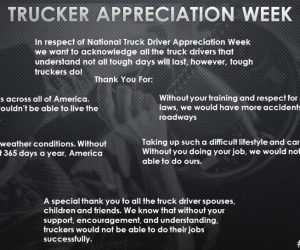We are hearing more about the importance of truck driver physical fitness and the importance of maintaining health and well-being while on the road.  Very seldom do we hear about the importance of mental health.
Very seldom do we hear about the importance of mental health.
Those who choose to make a career at driving over the road, face many conditions that affect not only their physical health but also their mental well-being. Fatigue can play a big factor on a driver’s mental health. Physical and mental exhaustion can also affect a driver’s response time and attention span.
Managing Daily Stressors
Long hours and limited time at home can cause a driver to become depressed. Depression is a serious condition if left untreated.
Driving through unfamiliar territories and routes is stressful even for veteran truck drivers. Add in the tight deadlines, weather conditions, bumper to bumper traffic, and it is no surprise a driver may become a little agitated or anxious.
It is hard to manage what you cannot measure. The first step begins with realizing and admitting there is a mental health problem. Approximately 94% of drivers are men, per the Bureau of Labor Statistics men are usually less likely than women to seek treatment for emotional distress. To know if someone has mental health issues, it needs to be self-reported. Most people are willing to talk about a health problem, whereas not so willing about depression or mental health for fear of the stigma attached to it.
In 2010 a study was conducted that found more than 75% of drivers reported health problems, but only 19% admitted to mental stress or anxiety. It was determined that even if drivers were interested in help, or asked for treatment, it was difficult to get the treatment needed because of schedule restraints and access to mental health professionals.
Tips to Keep Good Mental Healthy
Living on the road, being away from home for extended periods of time can be tough. With all the stressors of driving day in and day out, it is vital to keep a regular routine. It is easy to get caught up in the day-to-day grind and forget to take enough time off to rest. The following tips help to break the monotony of driving your everyday routes.
- If possible, travel with a pet. Having a pet on board not only gives you companionship but also makes you take that extra break you deserve.
- If allowed, bring a friend or spouse along for the ride. Having conversation will help minimize feeling isolated.
- Make sure to call home, or a friend daily. Stay connected to the ones you love.
- Establish a day-to-day routine, get up at the same time, go to bed at the same time. This helps your mentality by having a routine.
- Bring bedding or pictures from home. This often minimizes the homesick feeling.
- Bring a tv and or video game on the road. Make yourself take a break to watch the news or play a game.
- Music can take us to different times and places in our lives and relive memories. Often bringing smiles and laughter to our day.
- Take time for personal hygiene. A fresh shower always helps one to feel better.
- Plan your day before you start. Make the time to stop and smell the flowers.
- Bring food and supplies from home to help lessen the financial burden and stress.
- Occasionally, splurge on a hotel room to get away from the truck and kick back comfortably.
There are times when stressors of home or living on the road is too much. Finding someone to talk to and letting them know how you feel can often relieve the stress. When life feels too heavy to carry, make sure to follow up with your primary healthcare provider. A medical professional is confidential and can help you sort out the stressors and is a good listening ear.
Trucking companies are listening to drivers more and trying to help. Driving for non-forced dispatching companies can contribute to less stress. Landstar Trucking Industry wants to establish an open relationship with their drivers to communicate about any trucker health issues that should arise.



 The transportation industry is America’s lifeblood, by carrying vital food and supplies across the country. ...
The transportation industry is America’s lifeblood, by carrying vital food and supplies across the country. ...

